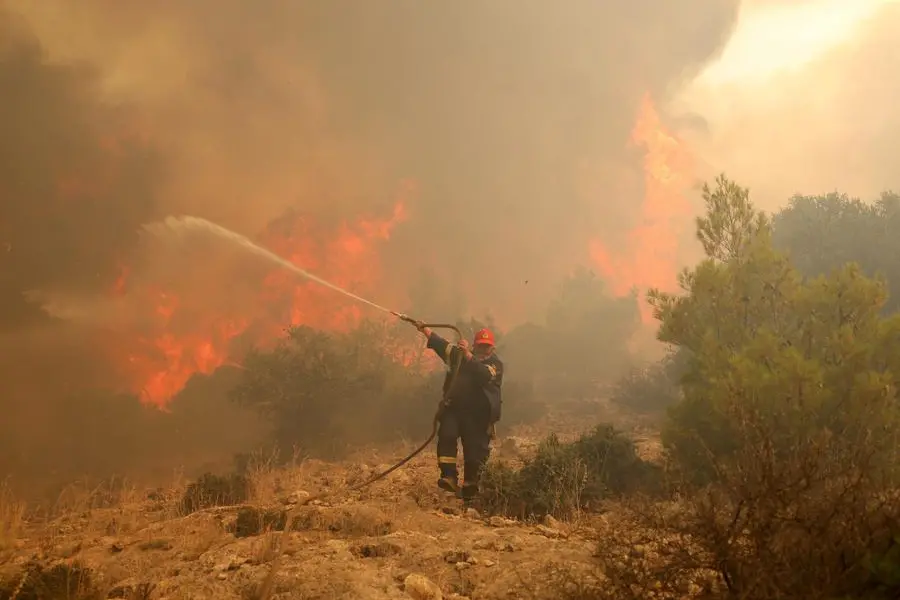PHOTO
Wildfires burned for a third day west of the Greek capital Athens on Wednesday, as authorities braced for a new heatwave stoking tinderbox conditions across the country.
At first light, air water bombers resumed operations over the towns of Mandra, west of Athens, and Loutraki, close to the Corinth canal which separates mainland Greece from the Peloponnese.
Firefighters worked through the night to keep flames at bay and away from a complex of coastal refineries.
By Wednesday morning, the blaze was close to residential areas, but was away from the Corinth refineries, a fire brigade official told Reuters, as soaring temperatures and strong winds hindered firefighters' efforts to bring it under control.
Flames kept roaring back to life as winds constantly changed direction, and thick smoke blanketed the wider area, state ERT TV said.
Four aircraft sent from Italy and France will join the efforts on Wednesday, authorities said. Firemen across the country have been deployed to help battle the blazes.
Fires are common in Greece, but hotter and drier summers have turned the Mediterranean into a wildfire hotspot in recent years.
Dozens of homes were gutted and hundreds forced to flee towering flames which seared through hamlets on Tuesday. Traffic was suspended for hours on two roads connecting the mainland to the Peloponnese. They were partially reopened late on Tuesday.
'ON HIGH ALERT'
The fire brigade reported that a third fire had broken out on the island of Rhodes, burning forestland far from residential areas, so far.
Civil Protection Minister Vassilis Kikilias said the state was making "superhuman efforts" to tame the flames and warned that weather conditions would be challenging on Wednesday.
Prime Minister Kyriakos Mitsotakis was expected to visit the national operations' centre to be briefed over the fires.
The fire risk hazard was high throughout the country.
"We remain on a level of high alert," said fire brigade spokesman Vassilis Varthakogiannis.
The Greek meteorological service had warned of a heightened risk of fires this week, as the country recovers from the first major heatwave of the summer. A second heatwave was forecast to start on Thursday.
"Conditions are extreme, and are likely to be so for another week," Kostas Tsigas, head of the fire brigade officers association, told Greece's SKAI TV.
The blaze, which broke out on Monday in the region of Dervenochoria, about 30 km north of Athens, spread rapidly as it was fanned by erratic winds and reached Mandra on Tuesday, burning houses and forcing people to flee.
Not everyone went willingly. Footage by Greek police showed officers imploring a reluctant group of nuns chanting hymns to evacuate a convent, and another of police screaming "let's go" as towering flames closed in at a timber yard.
"We put all our effort into making this, we built this, and now it's all gone," said Andreas Theodosiadis, a resident of Mandra, standing near debris and cars hollowed out by fire.
The broader region has had bitter previous experience with natural disasters. In 2017, Mandra, a largely industrial area, was hit by flash floods that killed 24 people.
A year later, 101 people died in the seaside town of Mati, east of Athens, which was razed by a wildfire in a matter of hours.
(Reporting by Michele Kambas and Stamos Prousalis; Additional reporting by Lefteris Papadimas and Renee Maltezou; Editing by David Holmes and Bernadette Baum)





















